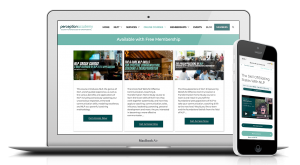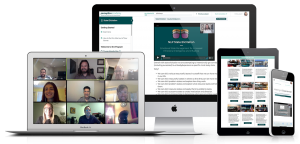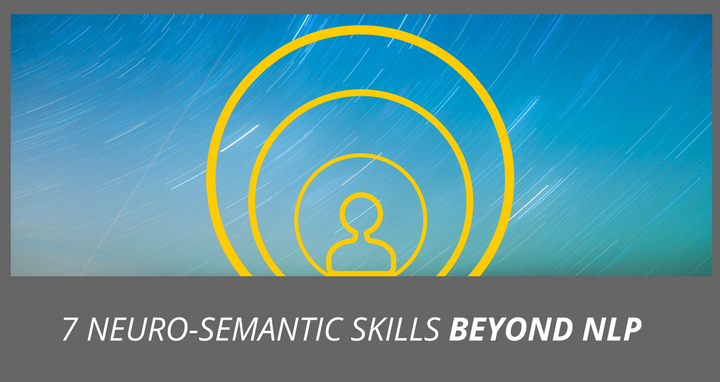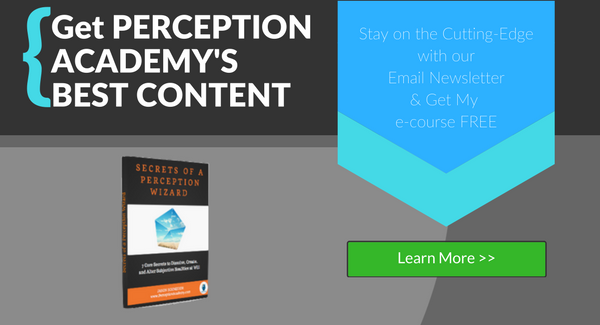You may be familiar with the core skills of Neuro-Linguistic Programming, but what are the core skills of Neuro-Semantics?
While there are hundreds of skills and subskills in the field of Neuro-Semantics, I thought I would offer my top 7 skills here.
Skill #1: Meta-Stating
If you are even a little familiar with Neuro-Semantics you will know that basic Meta-Stating is the first and foremost skill that Neuro-Semantics contributes to the field of NLP.
Not to be confused with collapsing anchors, the skill Meta-Stating applies one state to another state at a meta-level until it coalesces into a new primary level experience.
This creates special qualities of the primary state, for example, calm curiosity vs. energized curiosity.
Whereas in traditional NLP we had the ability to ‘stack anchors’, with Meta-Stating you can create extremely specific designer states that are much more fine-tuned and organized just the way you want to experience it.
The skill of Meta-Stating allows us to temper states and fine tune them until they are just right.
For more on Meta-Stating you can browse deeper into my FAQ/Articles and check out this book:
Skill #2: Gestalting
Gestalting is a more advanced Neuro-Semantic skill for the practiced Meta-Stater.
When we can layer and layer meta-states upon a primary state while holding the primary state firm – something more than the sum of its parts can emerge.
For example, in the Meta-Stating Self-Esteem Pattern we layer the states of Acceptance, Appreciation, and Awe onto our Concept of Self — and if done well — something greater than the sum of its parts emerges… unconditional self-esteem!
For a short 1 minute video of a client’s experience of the gestalting process click play below:
Skill #3: Grounding a Matrix
An important skill when working at the meta-levels is the skill of taking the ‘frames’ & ‘matrix’ of a client and being able to ground them in an objective/sensory-based experience.
While this skill is partially present in NLP with the Meta-Model, in Neuro-Semantics we recognize that there is an entire matrix hiding in the background of each primary level experience.
In Neuro-Semantics – not only do we ground experience in sensory-based terms – but we gain the ability to ground each meta-level in the previous level so we can explore the richness of the client’s matrix while they are in a particular state.
In grounding the matrix to a primary experience (and anchoring that experience) we are able to explore all of the hidden meta-levels associated with that primary state using the skill of meta-questioning to explore the vastness of the client’s internal universe.
Skill #4: Meta-Questioning
We can use our skill of ‘meta-questioning’ to explore the hidden matrix of any primary state layer upon layer.
While NLP most commonly uses the meta-questions of ‘value’ and ‘intention’, Neuro-Semantics opens us up to explore 110+ different meta-level facets of experience – each with subtle differences in effect.
The Meta-States Model of Neuro-Semantics also adds the ability to explore laterally & vertically at each logical level, allowing us to build up some pretty rich models of subjective experience when necessary.
Meta-Questioning gives the practitioner the ability to explore the richness of the unconscious levels of language beliefs & frames in an organized and robust manner.
Skill #5: Quality Controlling
Once we have explored someone’s matrix around a given experience, in a given context, we have the ability to ‘quality control’ that matrix.
In NLP this skill exists as an ecology check – but in my opinion, the distinction of ‘quality controlling’ adds a richness beyond our ecology checks (which are still extremely important).
Using the Neuro-Semantic skill of quality control we can check the ecology/quality of any behavior, thought, frame of mind, and even quality control an entire matrix as to whether or not it serves us.
Using the Meta-States Model of Neuro-Semantic we can also use ‘layered quality controls’ and ‘layered ecology checks’ for some additional oomph and to really lock in the state!
To this day I still remember the first time I saw this in action and it was a game changer once I added this to my coaching and change work!
For a more in-depth video on one way you can use the quality controlling skill check out this:
Skill #6: Pre-framing
Simply put, pre-framing is the art of setting expectations.
When we set expectations in advance it can save us a lot of time and energy dealing with interruptions, objections, confusion, distractions and a host of other unresourceful events.
The first time I really understood the concept of pre-framing was at a Neuro-Semantics Training when I was sharing a hotel with another participant…
I was planning to go out late socializing with some of the other participants and my ‘roommate’ was going to stay in the room — but I didn’t want to disturb him when I returned home.
What was the advice of one of the other Trainers?
“Frame it up!”
He told me, “Before you go out, let him know that you will be coming home late and that you may be making some noise. Ask him if that is okay. If he says yes, you can bang around and make as much noise as you want!”
While he gave me that advice half-jokingly — the principle really stuck with me!
If you frame something up in advance you can get away with a lot!
While pre-framing exists in the field of NLP, I think Neuro-Semantics puts an additional emphasis on it beyond what I have seen in traditional NLP trainings.
In Neuro-Semantics we say “an ounce of pre-framing is worth a pound a framing” so getting good at this skill is a real time and energy saver in terms of being an effective communicator.

Skill #7: Outframing
Outframing takes what was known in NLP as ‘context reframing’ to the next level.
In NLP ‘context reframing’ was typically used by finding a context where an unresourceful behavior would be resourceful.
For example, somebody is a compulsive cleaner? Please bring them to my house!
Somebody is always speeding in their car? Professional race car drivers make a living doing that!
In Neuro-Semantics, outframing goes well beyond that allowing us to transcend ideas at any level and even transcend entire matrixes with ease and grace.
As we say in Neuro-Semantics, “Whoever sets the highest frame runs the game” – making ‘outframing’ a powerful Neuro-Semantic skill to learn, practice, and ultimately master.
So there you have it!
6 Neuro-Semantic Skills beyond traditional NLP.
Would you like me to add anything to this list? Feel free to comment on my Facebook Community Page: fb.com/perceptionacademy
In addition to taking my NLP to the next level, these skills have helped a ton of my colleagues and clients take their NLP, Personal Development & Coaching to the next level as well. And as always, if you have any questions, feel free to reach out and ask. I’m here to help!
Want to Learn More Neuro-Semantic NLP?
If you’ve made it to the bottom of this article I can probably assume you’re interested in learning about Neuro-Semantic NLP and the difference it can make in your life, personally and professionally.
Here at the Perception Academy, I am on a mission to spread this information as far and wide as possible so I will continue to share as much of this cutting-edge material as I can for free. This is my legacy.
Want to Learn More Neuro-Semantic NLP?
Here at the Perception Academy, I am on a mission to spread this information as far and wide as possible so I will continue to share as much of this cutting-edge material as I can.
Online Courses
The courses are designed in a way that is well organized for your ease of learning, information retention, and immediate application to deliver a life-changing experience for you and those with whom you communicate.

INSIDERS Group Membership
Want ongoing support? Get INSIDER level course access, two live events & online courses/month, two monthly practice sessions, Q&A calls, a private group for mutual support and more...

Private 1-1 Coaching
Want to work with me privately for 1-1 coaching or mentoring via video chat? While I typically have a waiting list for private sessions, you can learn more and apply here.




